Pan de Muerto (Bread of the Dead)
53
Updated Aug 27, 2025, Published Oct 28, 2011
This post may contain affiliate links. Please read our disclosure policy.
Día de los Muertos (Day of the Dead) is one of Mexico’s most meaningful traditions, and no celebration is complete without Pan de Muerto. This slightly sweet, fluffy bread is decorated with bone-shaped dough pieces and dusted with sugar, making it both symbolic and delicious. Whether enjoyed with coffee or placed on an altar (ofrenda) to honor loved ones, this bread is a must-have during the holiday.

If you’ve only ever bought it from a panadería, I promise you—making it at home is extra special. It’s easier than you think, and the hint of orange and anise makes your whole kitchen smell heavenly.
Table of Contents
Featured In
This Pan de Muerto recipe is featured in buzzfeed.com: 12 Día De Muertos Recipes That Are Just As Fun To Make As They Are To Eat.
What is Pan de Muerto?
Pan de Muerto, or “Bread of the Dead,” is a traditional Mexican sweet bread baked for Día de los Muertos, celebrated November 1st and 2nd. The round loaf is topped with dough “bones” and a small round “skull” in the center. The bread is typically flavored with orange zest, orange blossom water (or extract), and anise, and finished with a sugar glaze.
Families enjoy it at home, share it with friends, and also leave it on altars or gravesites along with other offerings such as water, flowers, and candles.

Why You’ll Love This Pan de Muerto Recipe
- Traditional & symbolic – a classic Día de los Muertos recipe that’s full of meaning.
- Fluffy & fragrant – orange and anise give the bread a warm, comforting flavor.
- Perfect for sharing – makes multiple loaves, so you can enjoy some and place one on your altar.
- Homemade with love – baking it yourself makes it extra special, especially when honoring loved ones.
Ingredients & Substitutions
Here’s what you’ll need to make this traditional bread:
- Flour – all-purpose flour works best.
- Yeast – active dry yeast helps the bread rise beautifully.
- Milk & butter – for a soft, rich texture.
- Eggs – add structure and richness.
- Sugar – both in the dough and as the sweet finish.
- Orange zest & orange extract – for that classic citrus flavor. (You can use orange blossom water if you find it.)
- Anise seeds – give the bread a subtle spiced flavor.
- Salt – to balance the sweetness.
👉 The full list of ingredients, quantities, and instructions can be found in the printable recipe card below.
How to Make Pan de Muerto
Step 1: Make the dough. Dissolve yeast in warm milk, then mix in flour, sugar, butter, eggs, salt, orange zest, orange extract, and anise. Knead until smooth and elastic.
Step 2: First rise. Place the dough in a greased bowl, cover, and let it rise until doubled in size (about 1½ hours).
Step 3: Shape the loaves. Divide the dough into portions. Shape each into a round loaf, then create thin dough “bones” and a small round “skull” to place on top.
Step 4: Second rise. Place loaves on a baking sheet, cover, and let rise again until puffy.
Step 5: Bake. Bake in a preheated oven until golden brown and cooked through.
Step 6: Glaze & sugar. Brush warm bread with melted butter or orange glaze, then sprinkle with granulated sugar.
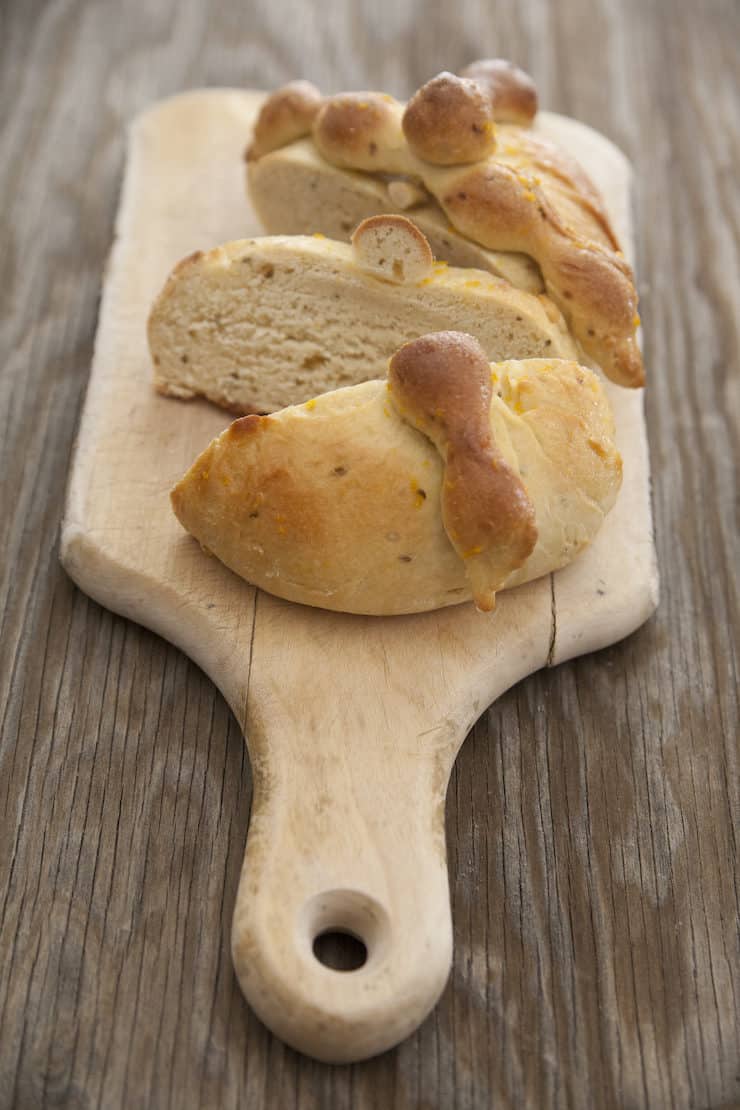
Serving Suggestions
- Enjoy warm with a cup of cafe de olla or Mexican hot chocolate.
- Place a loaf on your altar (ofrenda) with a variety of Mexican pan dulce, glass of water, candles, and marigolds to honor loved ones.
- Wrap in cellophane and share with family or neighbors—it makes a beautiful gift.

Pan de Muerto Expert Tips & Tricks
- For a stronger citrus flavor, use orange blossom water instead of extract.
- Don’t rush the rising time—this bread needs it for a fluffy texture.
- Try different finishes: a simple sugar dusting, cinnamon sugar, or an orange glaze.
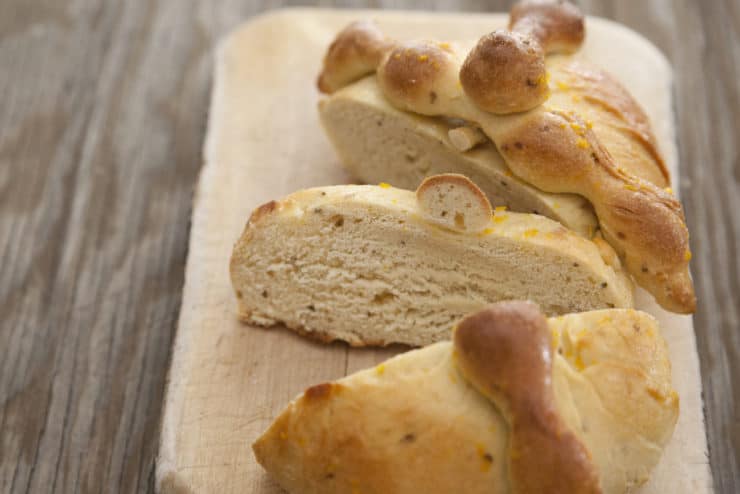
Storage & Reheating
- Room temperature: Store at room temperature, loosely covered with a clean towel, for up to 3 days.
- Reheating: Warm in the oven at 300°F for 5–10 minutes before serving.
- Freezing: Make sure the loaf is completely cooled before freezing to avoid soggy bread or mold. Wrap it tightly in plastic wrap, then wrap again in foil or freezer paper. For best flavor and texture, use within 6 months.
- Leftovers: Leftover Pan de Muerto makes amazing Mexican-French toast.
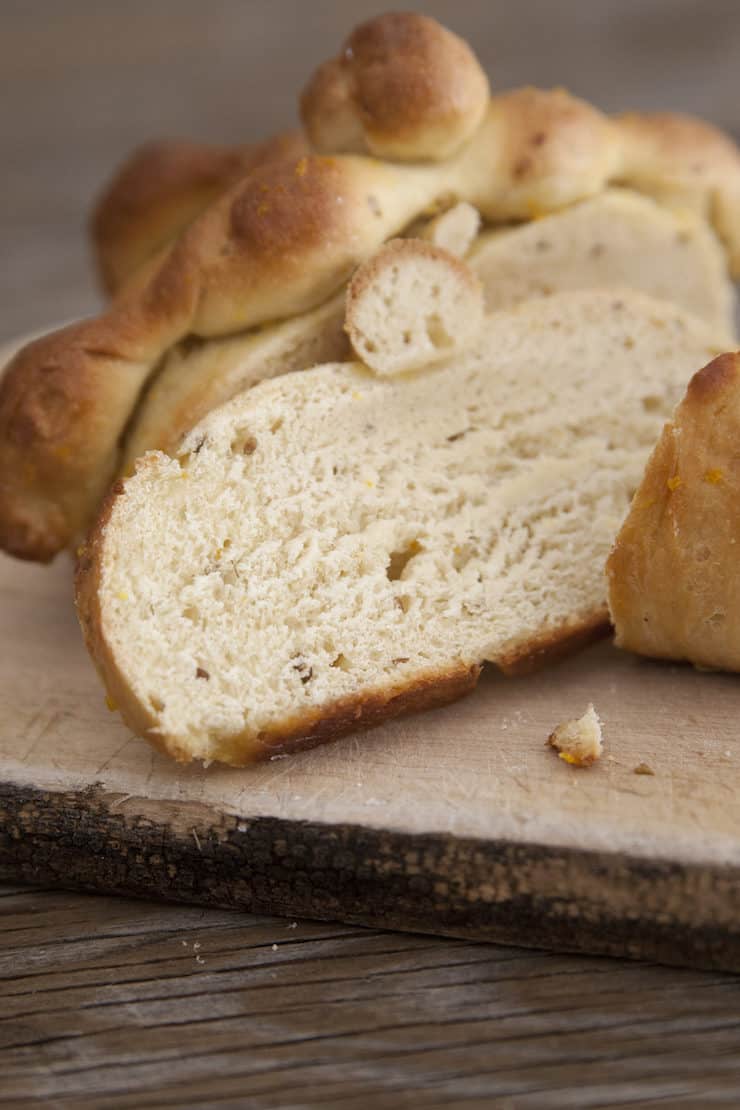
Frequently Asked Questions
The round loaf represents the circle of life and death, while the bone-shaped decorations symbolize the departed.
Yes, you can leave it out if you prefer, but it adds a traditional flavor. Cinnamon is a good alternative.
It’s typically enjoyed with coffee, such as cafe de olla, Mexican hot chocolate, or vanilla atole, often on November 1st and 2nd during Día de los Muertos.
Yes, you can use orange blossom water, fresh orange juice, or even orange liqueur instead.
Recipes for Día de los Muertos
If you tried this Pan de Muerto recipe or any other recipe on my blog, please leave a 🌟 star rating and let me know how it went in the comments below!

Summarize & Save This Content On

Pan de Muerto (Bread of the Dead)
Ingredients
- 1 stick unsalted butter
- ½ cup milk
- ½ cup water
- 5 to 5 ½ cups all-purpose flour, divided
- 2 packages active-dry yeast
- 1 teaspoon salt
- 1 tablespoon whole anise seed
- ½ cup granulated sugar
- 2 tablespoons orange extract
- zest of one orange
- 4 eggs
Orange Glaze:
- ½ cup granulated sugar
- 2 tablespoons grated orange zest
- 1/3 cup fresh orange juice
Instructions
- In a saucepan over medium heat, warm butter, milk, and water; until butter has melted. Do not let boil.
- In a large mixing bowl, combine ½ cup of flour, yeast, salt, anise seed, and sugar. Slowly beat in the warm milk, orange extract, and orange zest until well mixed. Add eggs, one at a time, mixing through. Slowly add in another 1 cup of flour. Continue adding additional flour until the dough is soft but not sticky.
- Turn the dough out onto a lightly-floured board and knead for at least 10 minutes or until smooth and elastic. If the dough is dry add some water and if it’s too wet add some flour. Form the dough into a large ball and cut into four even pieces.
- Lightly grease a cookie sheet and place three dough balls on it. Cover loosely with plastic wrap and let rise in warm place until doubled in size, approximately 1 to 1 ½ hours.
- Reserve the fourth dough ball to make bones to place over the loaves. Reserve this dough in the refrigerator to slow down the rising process.
- Follow this video for instructions on how to decorate the bread.
- Preheat oven to 350 degrees F.
- Bake bread for approximately 25 to 30 minutes. When the bread is done it should sound “hollow” when thumped.
- In a saucepan over medium heat, combine sugar, orange zest, and orange juice; bring just to a boil so the sugar is completely dissolved. Remove from heat.
- Remove loaf from the oven and brush with the Orange Glaze.
- Another option is to melt two tablespoons of butter in a small pot. As soon as the bread comes out of the oven brush with melted butter and sprinkle sugar over them.
- Let the bread cool down and enjoy with a cup of Champurrado or cafecito.
Notes
- Orange Flavor: For a stronger citrus flavor, use orange blossom water instead of orange extract.
- Glaze vs. Sugar: You can brush the bread with melted butter or orange glaze, then sprinkle with granulated sugar, cinnamon sugar, or leave it plain.
- Shape Options: Traditionally, the dough is formed into round loaves with bone shapes on top, but you can also make mini loaves or rolls.
- Storage: Store loosely covered at room temperature for up to 3 days. Reheat in a 300°F oven for 5–10 minutes.
- Leftovers: Leftover Pan de Muerto makes incredible French toast.
Nutrition
Nutrition information is automatically calculated, so should only be used as an approximation.
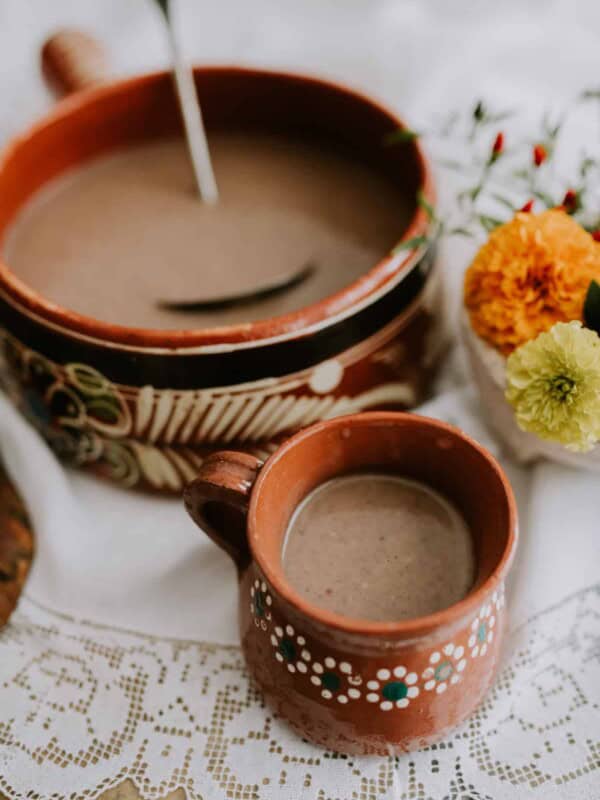




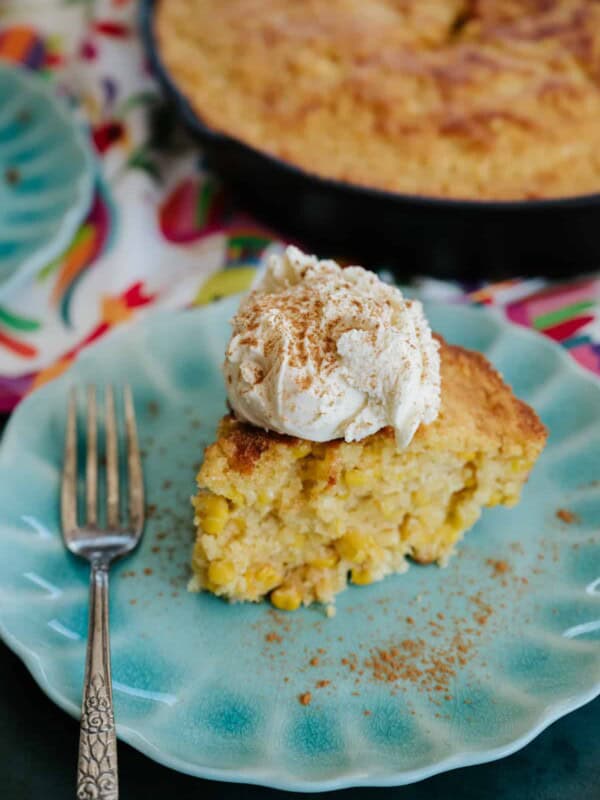
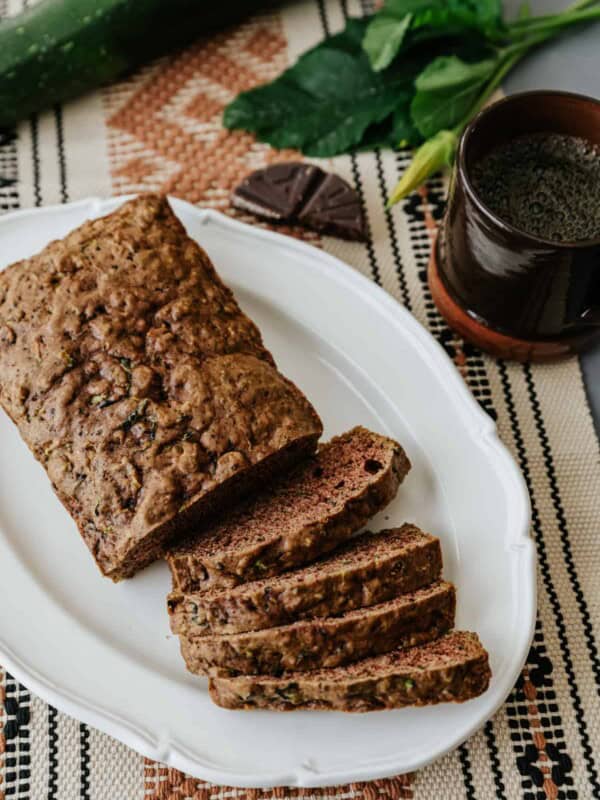
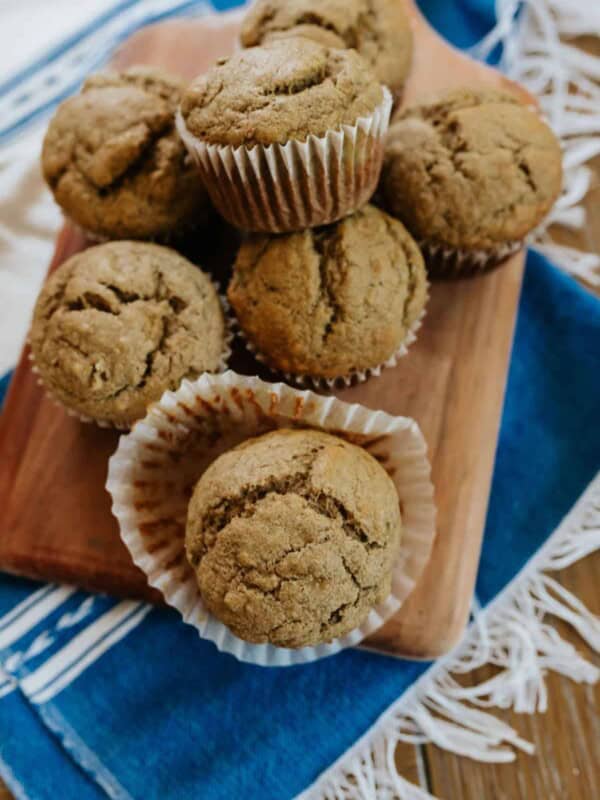









I want to start that I am not a baker. I made this for Dia de Muertos yesterday and it came out perfect. I followed the recipe exactly as written (save for using 1 tsp orange blossom water in place of orange extract… I would 2 tsp next time), and it was relatively easy and came out so delicious. I will be making this an annual tradition!
Delicious bread
Can you use a whole anise seed but crush it and does it need orange extract , cant seem to find it.
No need to crush the anise seeds. Keep whole. Fresh orange juice or orange liqueur are great substitutes for orange extract.
Thank you for the excellent recipe! I used it to make loaves for my middle school English as a Second Language classes as part of our cultural study of Dia de los Muertos. It was a big hit and even better than the pan de muerto I’ve bought from Hispanic grocery stores! I will definitely be using your recipe again!
So delicious! Great fluffy texture and sweet orange flavor.
I work for a public library, and am making a short booklet about the history of Dia de los Muertos to include in Sugar Skull Take & Make kits we are giving out for free. May I have your permission to include your Pan de Muerto bread recipe in the booklet? I will of course include your website in the citation.
Can you freeze a loaf? I made this today and it was delicious! Easier than I thought it would be.
So happy to hear that Penny! Thank you. Yes, you can freeze — make sure you allow it to cool before freezing to avoid soggy bread or mold. Wrap it tightly in plastic wrap. Then wrap it again in foil or freezer paper — try to use it within six months.
Me encantó mucho esta receta! Do you also have the recipe in Spanish? I know someone who wants to try, but she only speaks Spanish
Hi, not sure if I’ll be getting a response since this was posted awhile ago, but approximately what size are the finished loaves?
They are about 5 to 6 inches wide.
Thank you so much!
Wow! This looks incredibly delicious.